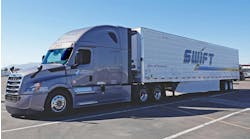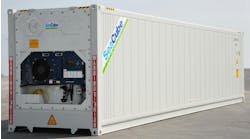Carrier Transicold to standardize ‘new-gen’ refrigerant
Carrier Transicold will begin to standardize new-generation refrigerant R-452A—which features a “significantly reduced” global warming potential (GWP)—in new North American transport refrigeration units later this year.
The new offering will help customers improve their sustainability profiles and achieve regulatory compliance, the company said.
“Carrier Transicold truck and trailer refrigeration units have been qualified for R-452A since 2017, and it has been available as a customer-specified option for several years,” said Bill Maddox, senior manager for product management at Carrier Transicold. “R-452A is already standard with some of our newer units, and we’re pleased to expand this standardization to the broader array of Carrier Transicold products, effectively halving the refrigerant GWP of our transport refrigeration offerings.”
Beginning in October, R-452A, with a GWP of 2,140, will become the standard refrigerant for all Carrier Transicold models that currently use R-404A, which has a GWP of 3,922.
The timing of the transition will help California customers placing orders for 2023, Carrier Transicold asserted. The California Air Resources Board (CARB) earlier this year approved a measure that requires all new transport refrigeration units placed into service in 2023 to use a refrigerant with a GWP of less than 2,200.
In 2025, Canada will require refrigerants with a GWP of less than 2,200 in new transport refrigeration units to reduce greenhouse gas emissions in accordance with the Kigali Agreement of the Montreal Protocol.
Previously, there was a significant cost differential between the new and traditional refrigerants, the company maintained. However, over the last several years that differential has diminished with changing demand and refrigerant production trends, helping encourage adoption of the more sustainable R-452A.
Maddox added that some customers with newer existing equipment already in service may consider switching from R-404A to R-452A “with relative ease.” Unlike some competitive systems that require replacement of a thermal expansion valve when converting, late-model Carrier Transicold systems—those with an electronic expansion valve—only require a software upgrade, along with purging the R-404A and replacing it with R-452A.
On Carrier Transicold truck units and older trailer units that use a mechanical expansion valve, the valve will require a manual adjustment or, in some cases, replacement based on the age of the model, the company said.



